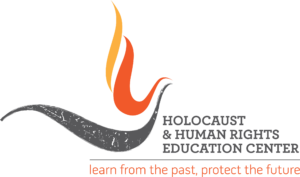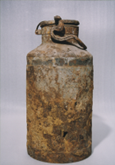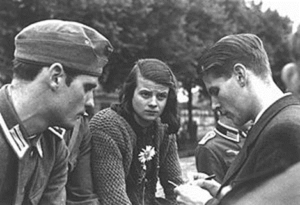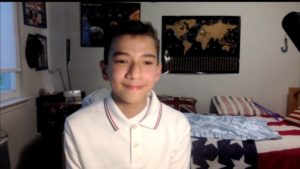The White Rose Student Research Competition
The Holocaust & Human Rights Education Center is pleased to announce our third annual White Rose Student Research Contest, open to 7th – 12th grade students.
About the Contest
The 2022-2023 contest theme is JEWISH RESISTANCE IN THE GHETTOS.
Photograph by Arnold Kramer
The enormity of the Holocaust was such that no victim response to it would have stopped the Germans from implementing genocide. Jews under Nazi control faced various and overwhelming obstacles to effective resistance. Despite this, Jews repeatedly sought to oppose Nazi policy in various ways. While armed uprisings or partisan activities are often held up as examples of successful Jewish resistance, not all resistance was armed. Often the only course of action available was an act of unarmed resistance.
Successful acts of resistance took many forms, ranging from personal acts to preserve dignity; social acts to preserve the community such as organizing clandestine schools, soup kitchens and underground record keeping; political acts such as the sabotage of the German war industry; and eventually, armed uprisings. Nowhere was resistance more robust than in the ghettos where Jews last lived as families and communities
and resistance activities occurred amidst extreme conditions and against enormous odds.
Contest Instructions
Using at least 3 of the documents provided below, plus a minimum of 2 outside resources, prepare an essay or documentary that addresses all parts of the following question:
Essential Question: Although armed resistance is often memorialized in art, literature and film, what other forms of resistance can people take when their beliefs, culture and lives are threatened?
- Research: Describe the goals and obstacles to one specific form of Jewish resistance in the ghettos. Explain how that method was used by one Jewish person or group.
- Reflection: Why do you think memorialization often focuses on armed resistance? Discuss how you might increase awareness and understanding through the memorialization of non-armed resistance.
You must base your research on at least three of the following documents. All documents referenced from this list are considered electronic sources and the Works Cited page should clearly denote that they were referenced from the HHREC site. That citation can take any format chosen by the teacher.
Documents
Though not one of the required documents, all students are encouraged to read United States Holocaust Memorial Museum's Resistance During the Holocaust booklet for reference. Please note this does NOT count as one of the 3 required documents from the list below.
"Oneg Shabbat, "The Jewish Underground Archives in the Warsaw Ghetto
Vladka Meed discusses illegal gatherings in the ghetto
"Our Town Is Burning" - Resistance Song
The Girl Couriers of the Underground Movement
Armed Resistance in the Ghettos: The Dilemma of Revolt
Call to Resistance by the Jewish Fighting Organization in the Warsaw Ghetto, January 1943
Proclamation by Jewish Pioneer Youth Group in Vilna, Calling for Resistance, January 1, 1942
Resources for the Reflection
Rapoport's Memorial to the Warsaw Ghetto Uprising – a Personal Interpretation
Additional Resources for Student Research
Holocaust Encyclopedia - Jewish Resistance
And There Was Courage by Moshe Avital- Available through HHREC
Writers and Poets in the Ghettos
Spiritual Resistance in the Ghettos
Essay Requirements
Criteria
- Evidence of comprehensive and accurate historical research
- Utilization and consistent citation of at least 3 of the designated documents and 2 additional resources
- Adherence to theme, demonstrating substantial supporting detail
- Proper citations – all citation styles are accepted, but citations must be consistent
- Essays must be free of plagiarism.
- Works Cited – Only sources cited in the body of the paper should appear on the Works Cited.
- Maximum of 1200 words.
- Submitted through the HHREC Website
All entries become property of the Holocaust & Human Rights Education Center and will not be returned. Applicants give the Holocaust & Human Rights Education Center permission to reprint entries. Decisions of the judges are final.
Documentary Requirements
Criteria
- A documentary is an audio/visual presentation that uses multiple source types such as images, video, and sound to communicate your historical argument, research, and interpretation of your response to this year’s topic. The reflection portion of your documentary should not exceed 90 seconds.
- Your documentary must be an original production.
- Documentaries should be at least seven minutes and not exceed ten minutes in length.
- The last portion of your documentary must be a list of acknowledgments and credits for sources of moving footage, interviews, music, and images that appear in the documentary. These source credits must be brief—not full bibliographic citations and not annotated.
- MP4 format submitted as a YouTube link.
- If selected as a finalist, students must submit the mp4 file to HHREC.
Process Paper
- Your entry must include a process paper. A process paper is a description of how you conducted your research and created your entry.
- The process paper must be 500 words and must not include quotes, images, or captions. Your process paper must answer the following questions:
-
- How did you choose your topic and how does it relate to this year’s theme?
- How did you conduct your research?
- How did you create your project?
- What is your historical argument?
Works Cited
Your Works Cited must meet the following requirements:
- List all sources that you utilized in developing your entry.
- Separate your Works Cited into two sections: one for sources from the required set of documents and one for sources you found to supplement your research.
- Do not attach materials to your Works Cited.
Submission
- Entries must be in mp4 format and can be submitted via a YouTube link. Finalists will need to supply the original file.
- Submitted through the HHREC Website
All entries become property of the Holocaust & Human Rights Education Center (HHREC) and will not be returned. Applicants give the HHREC permission to reprint entries. Decisions of the judges are final.
Guidelines for Educators
HHREC encourages teachers to utilize this contest as a classroom exercise.
- Sponsoring teachers are limited to submitting no more than 10 essays and 10 documentaries per age division.
- Educators must submit their finalist names and certify their participation through the entry form.
- Each essay or documentary should reflect the student’s own work, guided and reviewed, but not edited in detail by the sponsoring teacher.
- Entries must be submitted by the published deadline.
- Finalists and their sponsoring teacher will be recognized at a reception in May.
- All entries become property of the Holocaust & Human Rights Education Center and will not be returned.
- Applicants give the Holocaust & Human Rights Education Center permission to reprint entries.
- Decisions of the judges are final.
Eligibility & Entry Information
The White Rose Student Research Contest is open to 7th-12th grade students.
- Each contestant is limited to one entry per year.
- Previous winners may enter again.
- Projects will be evaluated on historical accuracy, development of content and theme, and original expression according to this rubric.
- All entries become property of the Holocaust & Human Rights Education Center and will not be returned.
- Applicants give the Holocaust & Human Rights Education Center permission to reprint entries.
- Decisions of the judges are final.
- Entries are accepted in two categories – documentary or essay.
- Entries are accepted in three age divisions – 7-8th grade, 9-10th grade and 11-12th grade.
- We ask students and educators to respect the privacy of the survivors and to refrain from conducting personal interviews.
Prizes
- Finalists will be identified by a panel of Blue Ribbon judges and honored at a reception in May.
- The top prize winner in each category and age level will be awarded a $300 prize.
- The sponsoring teacher of each first prize winner will be awarded a voucher worth $150 for use on professional development and/or Holocaust resources.
Sponsor
The contest is sponsored by the Holocaust & Human Rights Education Center and an anonymous donor.
Download 2023 Student Entry Form
SUBMISSION DEADLINE: MARCH 31, 2023
Questions? Contact Julie Scallero at jscallero@hhrecny.org or Robin Schamberg at rschamberg@hhrecny.org.
Members of the White Rose student resistance group, at the east railroad station in Munich, on the day the men departed to Russia for military service. Pictured are Hans Scholl (left), Alexander Schmorell (second from left, hidden), Sophie Scholl, and Christoph Probst (right). George J. Wittenstein (akg-images.co.uk)
The contest is named in memory of the White Rose, a resistance movement consisting of German university students. Among them were Hans and Sophie Scholl, along with several friends and their professor, were arrested and executed for distributing leaflets denouncing the policies of the Nazi regime. The project commemorates the efforts of these brave young people who gave their lives for what they believed in. May their memories inspire us to reflect upon our own responsibilities as citizens in a democratic nation.
2021 White Rose Student Research Competition
The Holocaust & Human Rights Education Center second annual White Rose Student Research Contest for Westchester County area 7th-12th grade students honored students and teachers from Irvington High School, Westchester Day School and Woodlands Middle/High School via Zoom.
Participating students who chose to compete in the contest submitted essays or original documentaries based on research of primary source and secondary source materials. Student and teacher entries included:
7th and 8th Grade Winners - Rachel Tratt, Westchester Day School and Jake Morton, Woodlands Middle School; and Finalist Annshiya Pulikkottil Sam, Woodlands Middle School.
11th and 12th Grade Winner - Alexandra Pollack, Irvington High School
Sponsoring Teachers - Christopher Barry, Irvington High School; Kasie Peralta, Woodlands Middle School; and Jill Rivel, Westchester Day School.
Winning entries for the HHREC White Rose Student Research Contest were identified by a panel of Blue-Ribbon judges that included Richard Berman, Ph.D. Muma College of Business, University of South Florida; Debbie Lewis, HHREC GenerationsForward speaker; Elena Procario-Foley, Ph.D. Professor of Religious Studies, Iona College; Debbie Minchin HHREC Educators Program Committee; and Audrey Reich Art Specialist, The Birch Wathen Lenox School.
The top prize winner in each age level was awarded a cash prize, and the sponsoring teacher of each first prize winner was awarded a voucher for use on professional development and/or Holocaust resources.
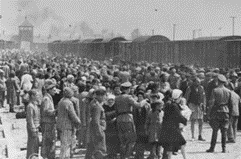
Jews from Subcarpathian Rus (then part of Hungary) undergo a selection on the ramp at Auschwitz-Birkenau. May 1, 1944. —Yad Vashem (Public Domain)
The 2021-2022 contest theme was Auschwitz and the Hungarian Deportations.
Seventy-seven years ago, in the spring of 1944, the Germans occupied Hungary. Between May 14 and July 9, approximately 440,000 Hungarian Jews—the last remaining intact Jewish community in Europe—were deported to Auschwitz-Birkenau, where most were subsequently murdered. This swift, concentrated destruction was aided by local collaborators, the Hungarian government, and law-enforcement agencies. It occurred when the Vatican, the International Red Cross, the Allies, and the neutral powers already knew details of the Holocaust, especially the Hungarian situation.
